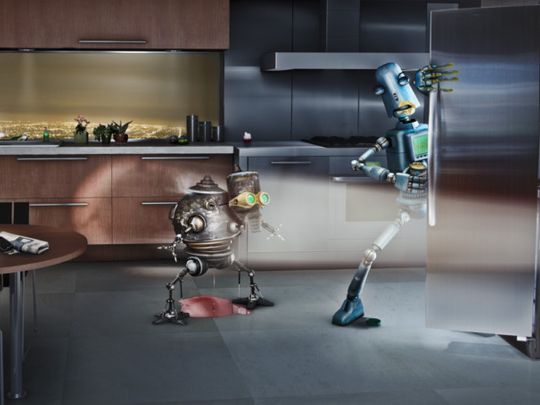
Technology changes, but people stay the same. If Daniel H. Wilson’s sci-fi notion in Robopocalypse chimes with modern tech companies seeking to revolutionise our homes, then the enduring modality of a person’s being is lazy, intransigent and incipiently domesticated.
At least that’s what the big technology conglomerates would have us believe. For if we do feel that we still need help scheduling a spin cycle, planning the next meal or hoovering the dusty floor — despite the fact that humankind has been doing so, of its own volition, for centuries — then the smart home, the cloud home and the all-round modern-day domestic robotic heroes are here to save the day.
This also means our currently abject and chaotic reservoirs of homely bliss and retreat are ripe for the picking.
A connected home
Three years after Samsung came out with its smart fridge, the connected kitchen is becoming an exciting topic once again, especially with Google’s $3.2-billion (about Dh11.75 billion) acquisition of Nest Labs, a home automation company that connects your home to the internet.
LG recently unveiled a service called the HomeChat app, which allows users to issue commands to everything from ovens to washing machines via text message.
A more natural way
Consumers will no longer need to learn machine commands, according to LG. We will just need to speak naturally and appliances will understand us and act on our zaniest culinary or hygiene whim.
Talking to Akihiko Inoue, General Manager of Cloud Solutions Centre, Research and Development Division at Panasonic, we get a good insight into the direction manufacturers see the industry taking, as well as their own motives. “People will be able to make much better use of their home appliances in a more natural way, and, what is more, the appliances will work intelligently and autonomously so that users can focus on just a few important things.
Inoue adds: “We aim to create a new concept of interface, where users won’t feel like they are really just operating machines, but more as if they are telling them what to do.
“We think the kitchen is one area with potential for adopting spoken-dialogue user interface, because one often needs to keep their hands busy while cooking. Besides, hands can be wet or dirty, which makes it difficult to operate touch screens and other typical interfaces that require finger input.”
Ultimately, he sees a future wherein “appliances grow into personalised concierges”.
UAE predisposed?
Of all the demographics in the world, Dubai and the UAE are probably the most predisposed to buy into another tech concept that cuts down on physical effort. But the idea of a concierge, or numerous concierges, waiting on your every command in the kitchen might seem far-fetched even for this part of the world.
Consumers are divided on the issue. Alex Wyke, a 23-year-old British expat I find trawling the Sharaf DG store in Dubai Mall, in the home appliances section, says: “I’m not sure I’d use the text message and cloud stuff. I’m setting up a home having just moved here and I will just be going about my washing and cooking, etc. in the same way as I’ve always done. It’s never been an issue before.
“I’m not proud, but I’m pretty sure I’m capable of controlling a machine without its help.”
Another consumer, 34-year-old Rajiv Bhajit, an Indian expat, says: “I’d use the cloud for gadgets in my home. Why not? If it can save me time, then it can’t be a bad thing. I don’t see it as a threat to the way I live — that’s just silly.”
But none of the consumers I speak to seem to care about the security issues that could accompany an eHome. Given the susceptibility of laptops and smart devices to hacking and viruses, the question should surely be asked — how secure is your smart home? “I guess we just have to have faith in the manufacturer and its software,” Bhajit says.
Sung Joo Cho, Product Manager at LG’s Electronics Home Appliance Group, acknowledges in a phone interview with GN Focus that security concerns are a challenge that needs to be confronted, but adds that the South Korean company is working on ensuring LG appliances come with no potentially invasive cyber strings attached. “This is a big topic for the industry. We know that people want to know how safe it is to have everything connected to a cloud, so we are currently working on a specialised LG software that comes with each cloud product.” There is no known delivery date for LG’s proposed security software.
A security report by Proofpoint, which delivers data protection solutions, claimed in January that Linux-run internet-connected household appliances have already been targeted by hackers. Cyberattacks on home appliances including televisions and fridges were used to fire out 750,000 spam emails between December 23 last year and January 6 this year.
Higher stakes
In a news report published by ITPro, a comprehensive technology news and reviews online hub for IT professionals, Proofpoint said that as the number of e-devices increases, an internet of things-based attack has significant security implications for device owners and enterprise targets. By hijacking home routers, smart appliances and other components of the so-called internet of things, cyber insurgents have the ability to transform these into thingbots to undertake similar hacking activities as botnets.
Writing in the MIT Technology Review, Rachel Metz says: “Now that the rush is on to add connectivity to everything from crockpots to light bulbs, the stakes get even higher — and more personal.
“Antivirus software helped PCs, but you can’t simply install a software suite developed for your desktop on a smart toaster. A number of tech companies and industry groups say that smart devices are hitting store shelves with little in the way of security protection. Security experts blame a number of factors for this problem: start-ups may put security in the backseat in their haste to get products out the door, and established companies that have traditionally operated offline could simply fail to realise that they need to protect against threats when it comes to internet-connected gadgets.”
It will be a while, therefore, before there is a safe environment in which trustworthy digitised concierges will take care of your domestic life.












